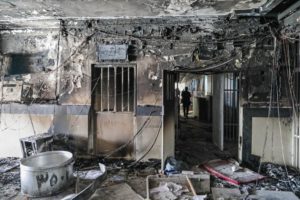Ethiopia, East Africa’s largest country and Africa’s longest independent country has been at war within itself since early November 2020. Stifled relationships and growing tensions between the central government and the Tigrayan People’s Liberation Front (TPLF), has amounted to an almost two-year civil war in the country’s northern Tigray region. Violence officially began when the incumbent Prime Minister Abiy Ahmed gave national troops the green-flag to advance against the Tigrayan forces.
The beginning of the civil war was the tip of the iceberg concerning the governance system in Ethiopia. Historically, Ethiopia has had a federal system of government even though the central government has wide-reaching influence over the federal regions. This system grants ethnic groups among the federal regions a degree of political power and influence. Since the military regime was toppled in 1991, a four-part coalition government was formed where the TPLF held major influence. Unfortunately, this coalition government was accused of stunting democratic leadership and enabling serious human rights violations.
The coalition government was dissolved due to growing concerns over leadership. Consequently, incumbent Prime Minister Abiy Ahmed was appointed as leader of the government under the Prosperity Party – which Tigrayan leaders firmly refused to be a part of. The reshuffle of power raised tensions within the Tigray region, but aroused a lot of hope within the rest of the country.
Prime Minister Abiy’s new style of “liberal” leadership threatened to destabilise the long-standing federal system of government in Ethiopia – weakening the relevance of Tigrayan leadership regionally and nationally. However, the Abiy regime has also made major breakthroughs for the nation. Such as the settlement of a long-term territorial dispute between Eritrea and Ethiopia, earning him a Nobel Peace Prize in 2019. On the other hand, this settlement struck the wrong chord with Tigrayan residents, as they are located directly at the Southern Eritrea-Northern Ethiopia border.
Tensions between Tigrayan leadership and the national government escalated further in 2020 regarding the issue of elections. Due to the COVID-19 pandemic being at its peak in 2020, the central government opted to postpone parliamentary and regional council elections until a further date. This was ignored by Tigrayan leaders. They chose to autonomously conduct their own regional elections. Upon conclusion, the central government involved national courts, and the Tigrayan elections were declared illegal.
Tigrayan leadership termed this verdict “a declaration of war”, further stressing the relationship between both leadership fronts. Soon after, the national government accused Tigrayan forces of attacking a national military base with the intention of stealing and destroying military supplies. The so-called attack was the final straw for Prime Minister Ahmed’s administration, prompting him to give the national army a directive to advance into the region.
This marked the beginning of a spiral of violence, which can be categorised as a civil war in the northern region. The conflict will have lasted two years as of November 2022.
Furthermore, the situation has been exacerbated by the long-lasting drought and famine in the northern region of Ethiopia and East Africa at large. According to the UNHCR, 40% of Tigrayan residents have no access to food or water. Furthermore, 3.5 million people have been displaced, excluding those who have fled into neighbouring countries. The violence has also caused a sharp increase in gender-based violence against women and children, with families being separated.
The deterioration of human rights in Ethiopia has been gaining attention from various inter-governmental organisations and individual governments. However, none of these institutions have influenced any pivotal change. As of October 15th 2022, national troops gained control of strategic cities within the Tigrayan region, with the help of Eritrean troops. This development has received mixed reactions: the lives of Tigrayans are being threatened, while the central government is restoring public confidence in it’s ability to control all national regions.
There are current peace talks between the Tigray regional forces and the national government being held in Pretoria, South Africa. Ethiopian communities worldwide also continue to speak against this war through social media, organised protests and lobbying with other governments and organisations, in an attempt to bring this destructive and unfortunate unrest to an end. However, as we speak, there is no clear direction for this civil war.







